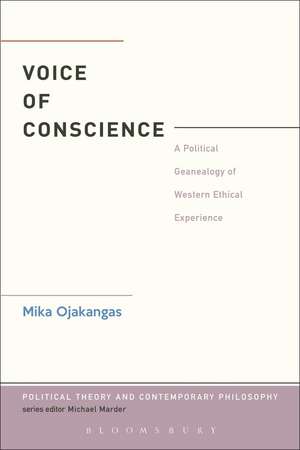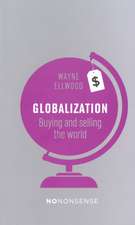The Voice of Conscience: A Political Genealogy of Western Ethical Experience: Political Theory and Contemporary Philosophy
Autor Dr. Mika Ojakangasen Limba Engleză Paperback – 28 ian 2015
| Toate formatele și edițiile | Preț | Express |
|---|---|---|
| Paperback (1) | 257.41 lei 6-8 săpt. | |
| Bloomsbury Publishing – 28 ian 2015 | 257.41 lei 6-8 săpt. | |
| Hardback (1) | 832.65 lei 6-8 săpt. | |
| Bloomsbury Publishing – 11 sep 2013 | 832.65 lei 6-8 săpt. |
Din seria Political Theory and Contemporary Philosophy
- 14%
 Preț: 192.73 lei
Preț: 192.73 lei - 23%
 Preț: 191.13 lei
Preț: 191.13 lei - 30%
 Preț: 540.80 lei
Preț: 540.80 lei - 13%
 Preț: 239.59 lei
Preț: 239.59 lei -
 Preț: 190.96 lei
Preț: 190.96 lei - 13%
 Preț: 237.75 lei
Preț: 237.75 lei - 13%
 Preț: 257.50 lei
Preț: 257.50 lei - 22%
 Preț: 256.29 lei
Preț: 256.29 lei - 22%
 Preț: 258.77 lei
Preț: 258.77 lei - 30%
 Preț: 774.20 lei
Preț: 774.20 lei - 23%
 Preț: 178.36 lei
Preț: 178.36 lei -
 Preț: 239.59 lei
Preț: 239.59 lei - 14%
 Preț: 191.13 lei
Preț: 191.13 lei - 22%
 Preț: 225.12 lei
Preț: 225.12 lei - 23%
 Preț: 222.84 lei
Preț: 222.84 lei - 21%
 Preț: 217.62 lei
Preț: 217.62 lei - 24%
 Preț: 188.01 lei
Preț: 188.01 lei - 30%
 Preț: 510.34 lei
Preț: 510.34 lei - 30%
 Preț: 511.81 lei
Preț: 511.81 lei - 18%
 Preț: 599.16 lei
Preț: 599.16 lei
Preț: 257.41 lei
Preț vechi: 295.33 lei
-13% Nou
Puncte Express: 386
Preț estimativ în valută:
49.25€ • 51.56$ • 40.76£
49.25€ • 51.56$ • 40.76£
Carte tipărită la comandă
Livrare economică 07-21 aprilie
Preluare comenzi: 021 569.72.76
Specificații
ISBN-13: 9781474218184
ISBN-10: 1474218180
Pagini: 264
Dimensiuni: 152 x 229 x 14 mm
Greutate: 0.36 kg
Editura: Bloomsbury Publishing
Colecția Bloomsbury Academic
Seria Political Theory and Contemporary Philosophy
Locul publicării:London, United Kingdom
ISBN-10: 1474218180
Pagini: 264
Dimensiuni: 152 x 229 x 14 mm
Greutate: 0.36 kg
Editura: Bloomsbury Publishing
Colecția Bloomsbury Academic
Seria Political Theory and Contemporary Philosophy
Locul publicării:London, United Kingdom
Caracteristici
Posits that the experience of conscience is the foundation of the Western ethico-political orientation
Notă biografică
Mika Ojakangas is Professor of Political Thought at the University of Jyvaskyla, Finland. The author of five books and over 80 articles, his research areas include continental political theory, the history of political and ethical thought, and political theology.
Cuprins
Acknowledgements1. Introduction 2. National Socialism and the Inner TruthThe Call of Heidegger's ConscienceNihilism of Judgment: Arendt3. Conscience in Moral and Political TheologyChurch Fathers between the Law and the SpiritSynderesis and Conscientia: ScholasticismDivine Instinct The Spark of the Soul: Eckhart and TaulerA Voluntarist Bias of William Ockham?The Lutheran RevocationThe Return of the Repressed: Spiritualists and PietistsCalvin's Compromise The Puritan God withinOn the Modern Protestant Conscience4. Conscience in Early Modern Moral and Political PhilosophyThe Witness of Natural Law from Suárez to PufendorfThe Candle of the Lord: Cambridge PlatonistsA Crisis of Conscience: Hobbes, Spinoza, Locke5. The Conscience of the Enlightenment The Moral Sense from Shaftesbury to SmithThe Judgement of Intuitive Reason: Clarke, Butler, Price, Reid and BeyondThe French Experience: from Bayle to RousseauThe German Model: Wolff versus CrusiusImmanuel Kant and the Infinite GuiltGerman Idealism: Conscience as Conviction6. From Political Theology to Theologized Politics7. Remarks on Late Modern ConscienceInternalized Coercion: Nietzsche and FreudThe Voice of the Other: Levinas and DerridaEthics of the Real: Lacan8. The Western Politics of ConscienceOn the Socratic Origins of the Politics of Conscience Conclusion
Recenzii
In this full and fascinating study of the history of conscience in the West, Ojakangas shows how conscience is the defining signature of Western political thought. Voice of Conscience is a work of immense scholarship leading towards a devastating conclusion: this conscience, invented by Plato's Socrates, gave birth to responsibility out of the experience of utter disorientation.
If you have ever been troubled, ever so slightly, by the resort to conscience at crucial moments of politics and life; if you have ever harboured a suspicion that the conscience is not quite revealing its true colours, then Voice of Conscience is the book for you. Tracing a radical continuity in theories and practices of the conscience, from Aristotle to Obama, this work outdoes Foucault for insight and Agamben for meticulous care with sources, to propose an arresting and extraordinary rereading of the function of conscience at the core of Western ethics and politics. The climax of the book, in which the basis of Western sovereignty is precisely the abandoned outcast, cut free from all ties that bind, reveals both the promise and subtle snares of the conscience itself.
Why has the metaphor of the voice of conscience been such a determining and persistent guide for the entire Western ethical thought? Mika Ojakangas considers it as 'the fundamental dogma of the Western tradition in ethics', its 'anti-dogmatic dogmatics', constituting the inner autonomy, conviction and faith beyond all external laws. This comprehensive and meticulously researched work provides an astounding and far-reaching genealogy of this enigma, reaching back to pre-Socratic times, encompassing the Socratic foundational moment, Christianity from church fathers through scholastics to Luther, scrutinizing the modern foundational moment in natural law, Rousseau and Kant, and reaching forth to Heidegger, Freud, Derrida, Levinas and Agamben. The voice of conscience, introducing a 'measureless measure' beyond social and political laws, ultimately aims at the void at the heart of being, yet far from being the firm support it purports to be, there is an agenda of political theology to be unraveled at its core. The most comprehensive account so far, a quintessential reading.
Mika Ojakanas demonstrates the different ways, from Socrates to Derrida and Lacan, the same puzzles and tropes reappear by which conscience can be both a source of repression and of our freedom, a foundation of ethical autonomy and basis of law, authority, nation and state. This is a highly readable and impressive work of scholarly erudition that presents the reader with a compelling story of a central feature of how Occidental philosophy, theology and politics have fashioned the way we understand and govern ourselves.
If you have ever been troubled, ever so slightly, by the resort to conscience at crucial moments of politics and life; if you have ever harboured a suspicion that the conscience is not quite revealing its true colours, then Voice of Conscience is the book for you. Tracing a radical continuity in theories and practices of the conscience, from Aristotle to Obama, this work outdoes Foucault for insight and Agamben for meticulous care with sources, to propose an arresting and extraordinary rereading of the function of conscience at the core of Western ethics and politics. The climax of the book, in which the basis of Western sovereignty is precisely the abandoned outcast, cut free from all ties that bind, reveals both the promise and subtle snares of the conscience itself.
Why has the metaphor of the voice of conscience been such a determining and persistent guide for the entire Western ethical thought? Mika Ojakangas considers it as 'the fundamental dogma of the Western tradition in ethics', its 'anti-dogmatic dogmatics', constituting the inner autonomy, conviction and faith beyond all external laws. This comprehensive and meticulously researched work provides an astounding and far-reaching genealogy of this enigma, reaching back to pre-Socratic times, encompassing the Socratic foundational moment, Christianity from church fathers through scholastics to Luther, scrutinizing the modern foundational moment in natural law, Rousseau and Kant, and reaching forth to Heidegger, Freud, Derrida, Levinas and Agamben. The voice of conscience, introducing a 'measureless measure' beyond social and political laws, ultimately aims at the void at the heart of being, yet far from being the firm support it purports to be, there is an agenda of political theology to be unraveled at its core. The most comprehensive account so far, a quintessential reading.
Mika Ojakanas demonstrates the different ways, from Socrates to Derrida and Lacan, the same puzzles and tropes reappear by which conscience can be both a source of repression and of our freedom, a foundation of ethical autonomy and basis of law, authority, nation and state. This is a highly readable and impressive work of scholarly erudition that presents the reader with a compelling story of a central feature of how Occidental philosophy, theology and politics have fashioned the way we understand and govern ourselves.














